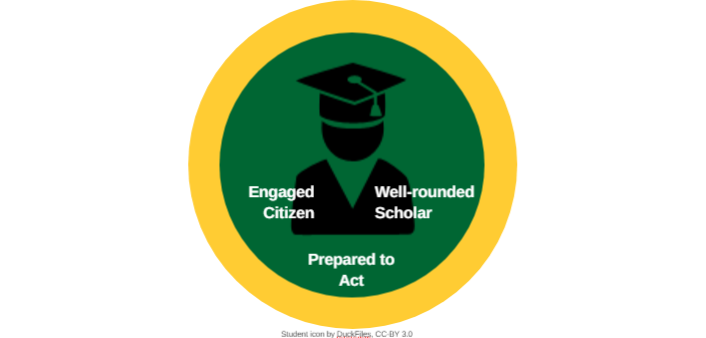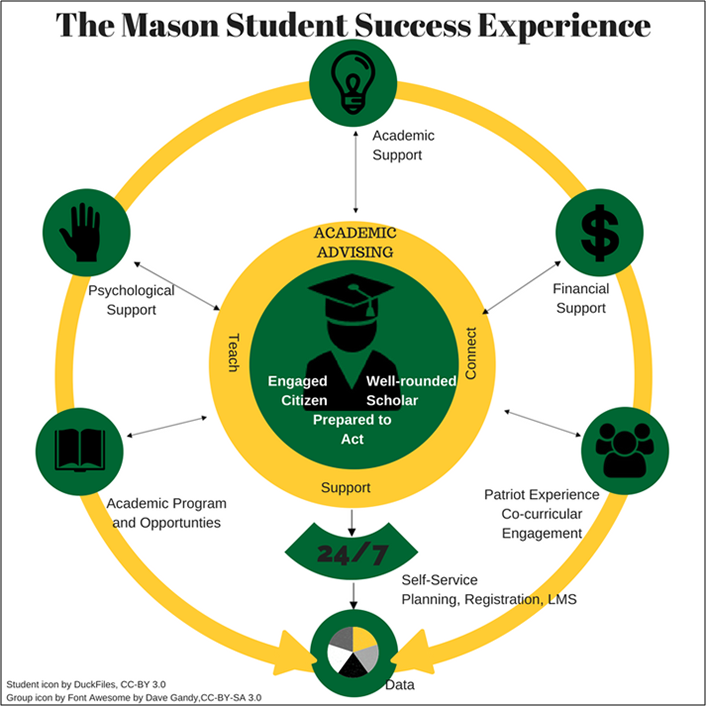
Change is hard in higher education. At George Mason University, a relatively young, large, diverse, and decentralized institution, we joke that our campus navigational systems were built for a canoe, and they are less effective now that we are an aircraft carrier.
We got big fast. Students, as well as faculty and staff, are struggling to adapt to this complexity. Our organizational model is bureaucratic and compartmentalized; it does not make intuitive sense to our students. Students can feel uncared for and frustrated when they are bounced from office to office without a clear understanding of which office is the right one to help them solve a problem. We affectionately call this experience the Mason Shuffle.
But now it’s time to stop the shuffle.
Academic Advising Reform
We identified academic advising reform as a top strategic priority for improving undergraduate retention and degree completion. A cross-campus committee got to work, resulting in recommendations for improving academic advising. In June 2014, the university:
- embraced a campus-wide vision and mission for academic advising that emphasizes the teaching and meaning-making aspects of advising,
- identified leadership in all the schools and colleges with responsibility for academic advising,
- outlined central functions and dispositions of academic advisors, and
- supported campus-wide coordination of advising assessment, professional development, and recognition.
The campus committee has partnered with a grassroots organization of academic advisors — the Mason Academic Advisor Network — to fulfill the promise of this coordinated campus-wide reform strategy.
Student Experience Redesign
Four vice presidents led an audit of the student experience, prompted by the realities of conflicting priorities, uncoordinated technology systems, student dissatisfaction, and limited resources. We began this project by imagining the ideal student experience, focusing on business processes and student services rather than courses and instruction. We then captured the way students experience our campus, and identified the gaps between reality and the ideal.
In the current phase of this ambitious project, smaller working teams are developing recommendations around six themes, including providing access to some services 24/7, creating a care network for new students, and revamping the student initiation process.
Planning and Advising Integration
The iPASS grant has been an accelerator to our work on academic advising reform. When we applied for the grant, we anticipated the student experience redesign process would be completed. Not so, but now the work is beginning to converge.
We aspire to create a portal through which students can access information and guidance that cut across office structures. We are adopting technologies to help students navigate a complex curriculum via dynamic degree planning and degree audit tools. We intend to use the advanced search features and predictive analytics in the Student Success Collaborative-Campus product to help academic advisors manage caseloads and identify students who need support before they are in crisis.
Initiative Fatigue
Our identity as an institution is baked into our mission statement: we are innovative and entrepreneurial. That translates in practice into many big ideas and lots of new initiatives. To avoid exacerbating the Mason Shuffle, we are working hard to integrate advising reform, student experience redesign, and iPASS adoption with two other efforts on campus that began as separate initiatives: the Mason Impact and the vision of a Mason Graduate.
Mason’s leadership is skillfully finding ways to integrate these projects by using foundational documents. We are finding that the vision of a Mason Graduate — an engaged citizen and well-rounded scholar who is prepared to act — is a compelling integrating force. It’s allowing us to build on our existing strengths while becoming more intentional about the student experience.

Stop the Shuffle
Aligning these initiatives is challenging and essential. The narrative of the Mason story is still unfolding, but our iPASS Vision Statement goes a long way to pull these projects together:
Our students come first. Mason commits to redesigning the student experience to meet their contemporary needs. Students will actively shape their own success by engaging the Mason community, technology, and improved systems and processes to become well-rounded scholars and engaged citizens who are prepared to act.
The path forward has not been linear. It takes time and teamwork to change the course of an aircraft carrier. We attribute our success to date to some core fundamentals. We have not always delivered on these recommendations within our own community, but we aspire to the following:
- Coordinate leadership. One of the vice presidents leading the student experience redesign project serves on the iPASS Leadership Team.
- Seek integration of language and purpose. Revise vision statements to align with other projects.
- Identify success metrics that are meaningful across projects. Communicate these outcomes to all stakeholders.
- Have patience. Change takes time. Incremental progress can be slow, but it may be more successful in the end.
- Listen to key stakeholders. Initiative and change fatigue are real and crippling. Find ways to commit to changes for some reasonable period of time and integrate initiatives wherever possible.
We are confident that the aircraft carrier has the right coordinates and will be making its way to our more student-centered, advising-rich vision of the future. We are motivated with our own modern-day rallying cry: #StoptheMasonShuffle.
Jeannie Brown Leonard is Dean of Student Academic Affairs – Advising, Retention, and Transitions at George Mason University in Fairfax, Virginia.
